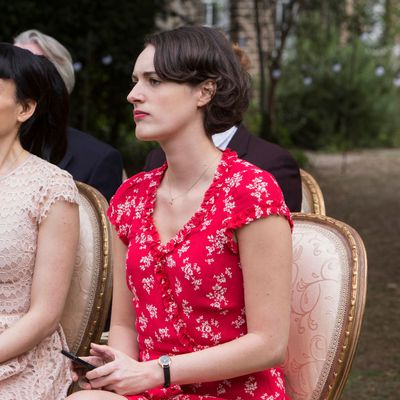
Fleabag is so funny and caustic that it’s easy to forget it’s actually about boundless grief. So many of Fleabag’s signature traits — her fourth-wall outbursts, her mischievousness, her licentiousness — are actually coping mechanisms, countering titanic waves of pain and loss with other titanic waves of feeling. But that subtext is made text in the show’s final installment, which forces each of the leads to reckon with the fears they’ve been hiding or distracting themselves from. It’s not a collection of happy endings, but it is a collection of right ones.
This ensemble focus is reflected by the episode’s title card, which doesn’t read Fleabag, but The Wedding. Again set over the course of just one day (Phoebe Waller-Bridge sure does love a compressed time span), it jumps right into Dad and Godmother’s nuptials, which turn out not to be the farce viewers might have expected. There are no cold feet, only Dad’s genuinely stuck one, and no ceremony-crashing declarations, unless the Priest accidentally dropping an F-bomb counts. It’s a marked counterpoint to the sloppiness of the season premiere, showing how the disappointments and resentments haven’t changed, but the characters’ relationships to them have.
That doesn’t mean that Godmother isn’t still suspicious of Fleabag’s ability to cause a scene. (“No more miscarriages,” she hisses at her through her teeth pre-ceremony.) But the real scene maker turns out to be Claire, who’s stopped envying Fleabag’s strong will and started flexing one of her own. She’s now the one doing the tequila shots, unafraid to blurt out the truth about her miscarriage, or to shove Martin’s heinous dinner-party insult about the “the goldfish wanting out of the bowl” back in his face.
That resolve is tested by a plaintive speech in which Martin, shocked by the truth of the miscarriage, manages to make himself almost sympathetic. While Claire’s conquered the corporate world, he reminds her, he’s the one who’s vacuumed the car and made dessert for Easter and picked up Jake from bassoon lessons. Yes, he has a drinking problem (“just like everyone else in this fucking country”), and yes, he’s a douche. But he does genuinely love Claire, even if he has almost exclusively fucked-up ways of showing it.
It’s an impressive closing argument (and another great performance by Brett Gelman), which makes it all the more remarkable that Claire is unmoved by it. When Martin tells her he won’t leave unless she gets on her knees and begs him, she’s already hiking up her skirt and heading for the floor. Claire is now a woman who knows her own power, and that’s in large part because her love for her sister (and the part of Claire’s own self that Fleabag represents) has overcome her fear. There’s a reason why her final act in the show, as she leaves to find Klare at the airport, is to ditch her fake extensions and reveal her true mane, a Fleabag-like bob. Hair is everything.
Hair also comes up in the Priest’s wedding speech, as one of the many things we worry about and suffer over when we fall in love. Romance, he reminds the wedding party, is not easy but hard, often coming at enormous cost to our careers, our family and friends, our safety and health, and yes, even our faith.
It’s an echo of the truth that Fleabag’s father shares in the attic, that she “knows how to love better than any of us, and that’s why [she] finds it all so painful.” Fleabag grieves more than others because she loves more than others, which is why she’s been so afraid to get back on the horse of loving someone again.
But whether by chance or divine intervention, the Priest and Fleabag found each other, and despite obstacles, decided the hope of their connection was more powerful than their fears of loss. The revelation that the Priest doesn’t want the relationship to continue doesn’t actually change the equation at all. He’s learned that he can have real, serious doubts about his faith and come out the other side. She’s learned that she can love again, and lose again, and the world won’t end.
The show’s final scene is about Fleabag reevaluating her relationship with her grief. Rather than try to dull the part of her that feels so enormously — the part that Dad tells her has been handed down by her mother — she can choose to tend it instead.
Godmother’s revelation that the nude statue is actually of Fleabag and Claire’s mother is a perfect one, both surprising and inevitable. Though Fleabag’s tried at various times to force the statue (and the role it represents) on Godmother, Claire, and Belinda, she’s always ended up stealing it back. On an elemental level, she’s known from the start the only way to survive her mother’s death (and Boo’s) is to honor the parts of them that live inside her.
As Fleabag weighs the statue in her hand, the ominous choral chants that have defined the season fall away, replaced with Alabama Shakes’ placid “This Feeling.” The battle cries and fourth-wall asides of Fleabag’s internal struggle are no longer necessary: she’s a whole person, fully unified with the enormity of her love and her grief. Talking to the camera was once her means of escape, but there’s nothing she needs to escape anymore. As promised, we’ve seen a love story — one every bit as unconventional and unforgettable as Fleabag herself.

